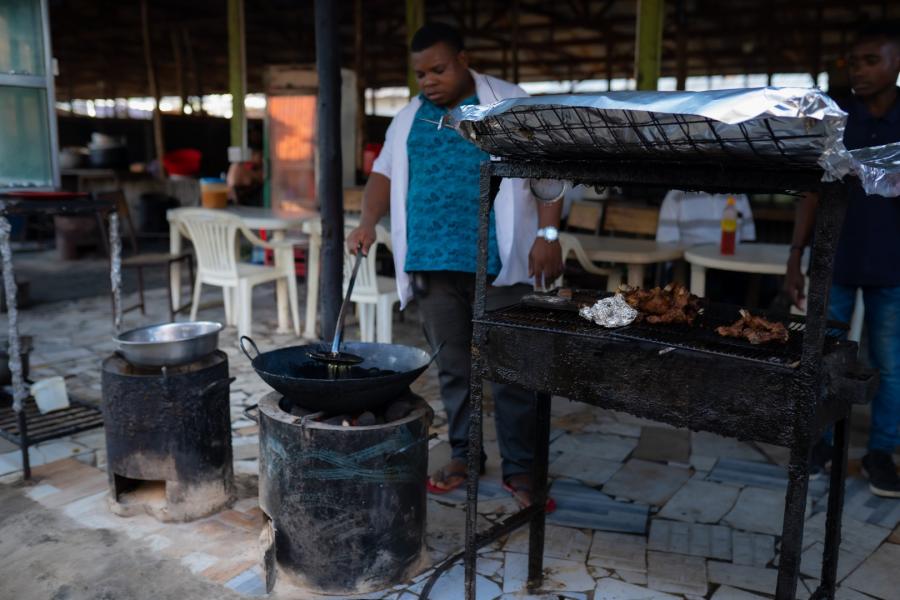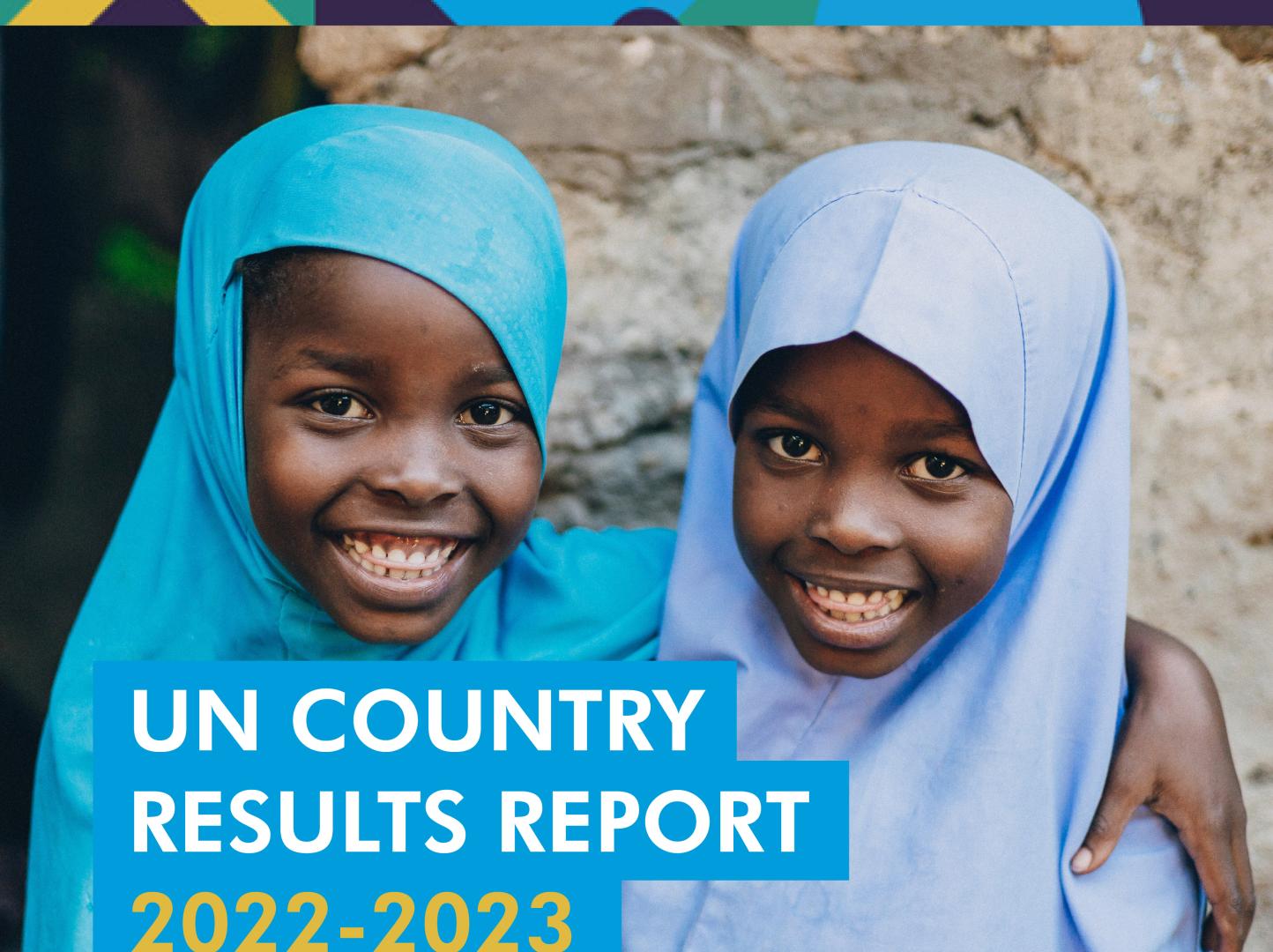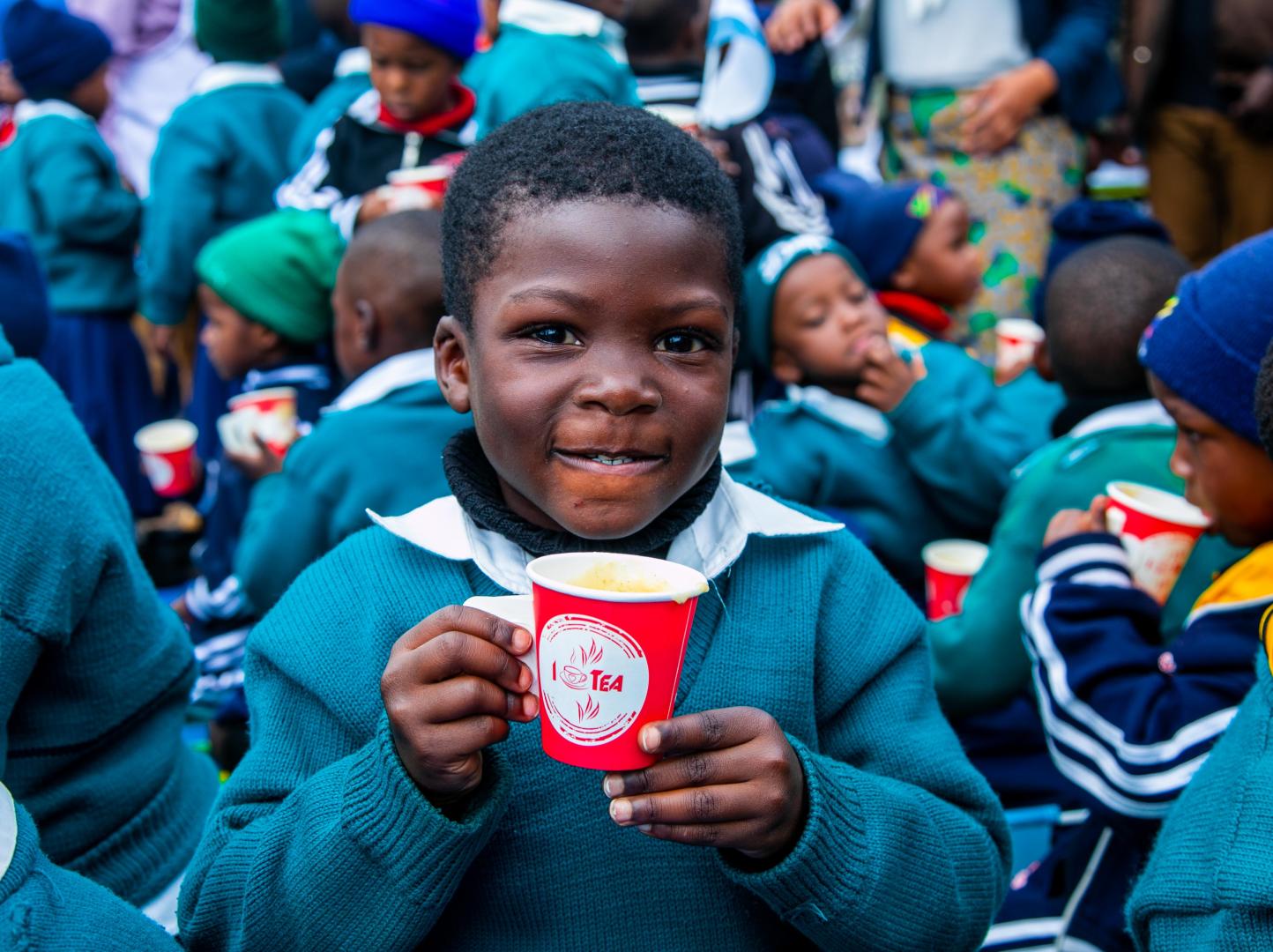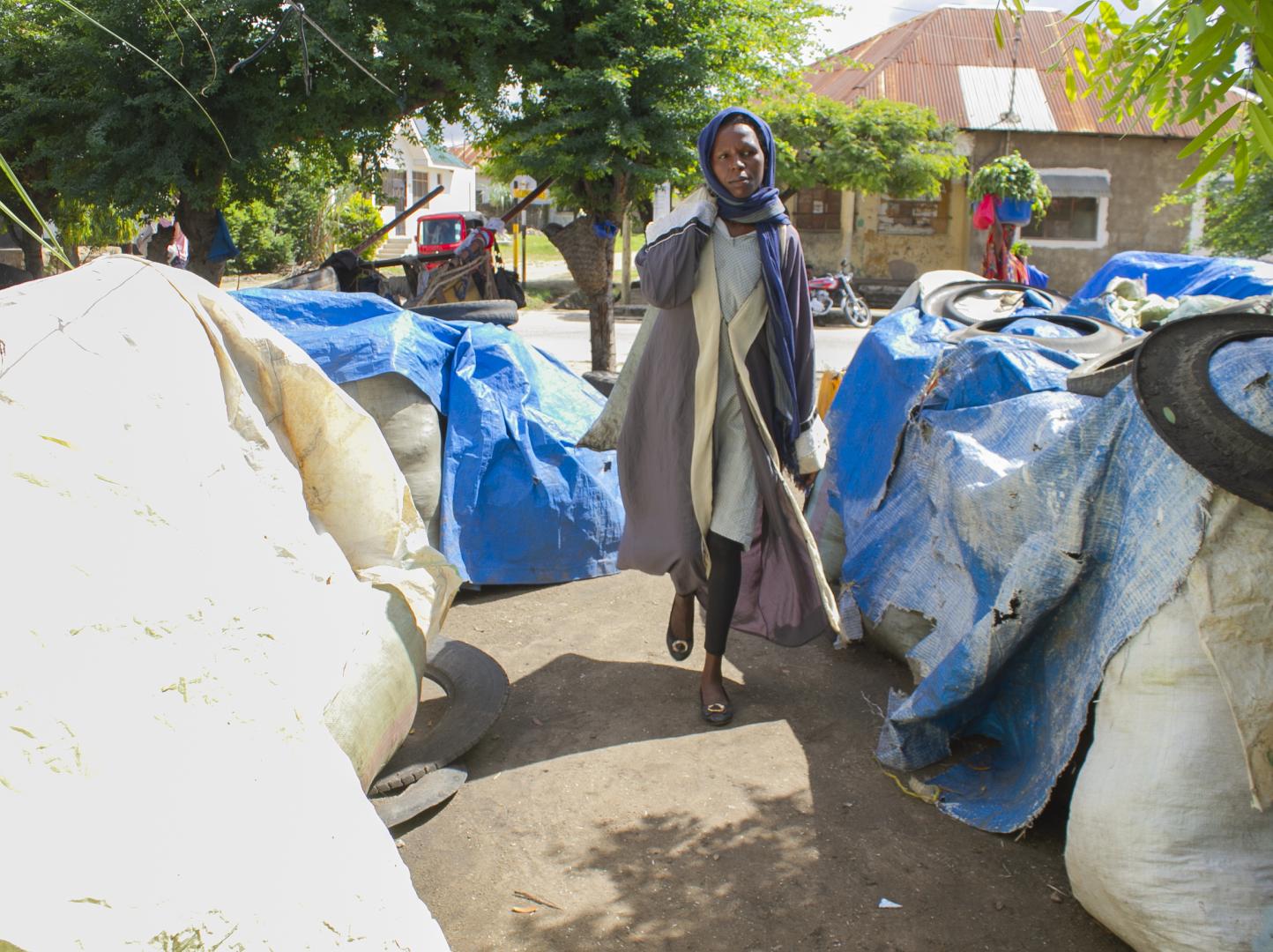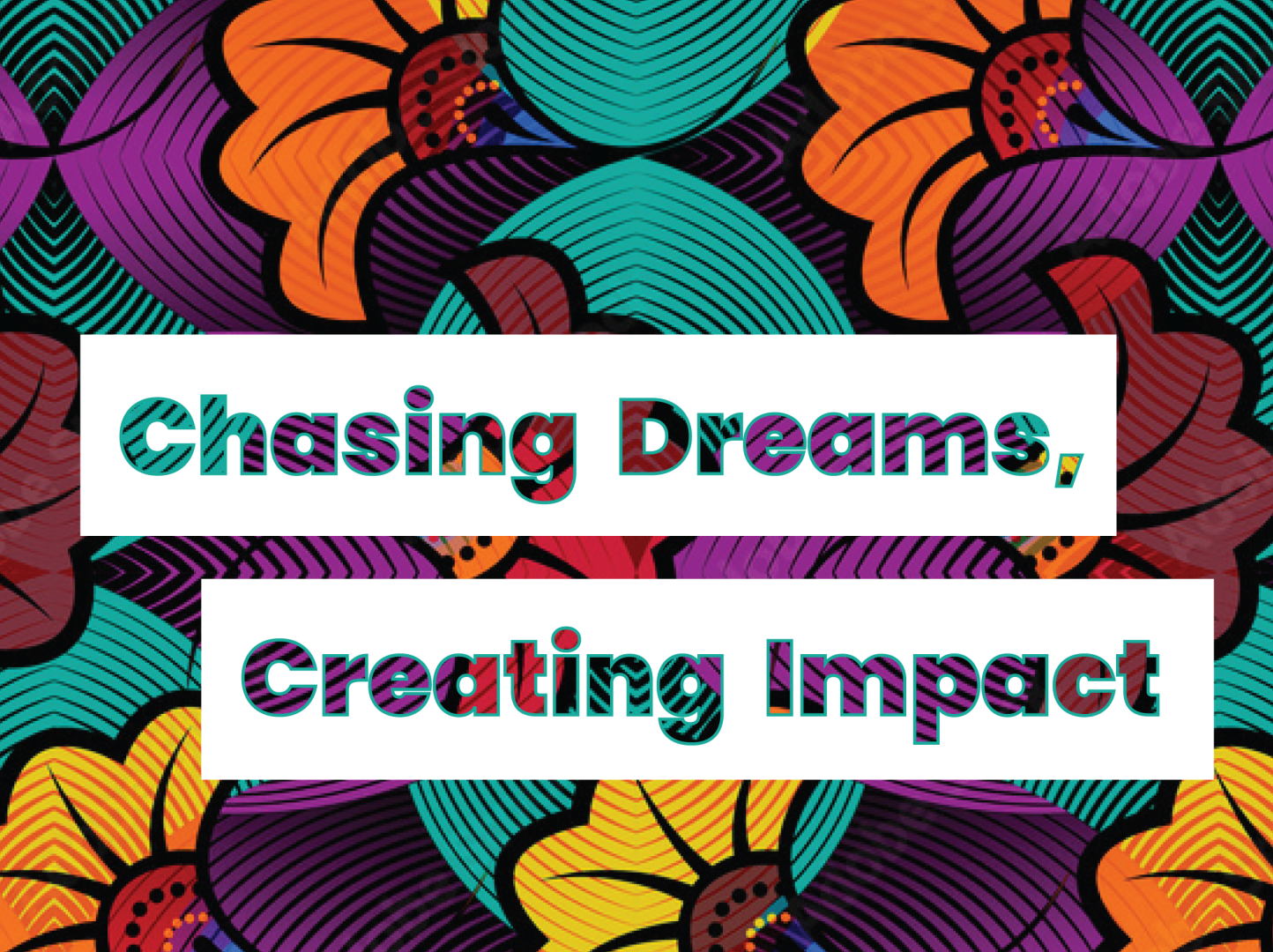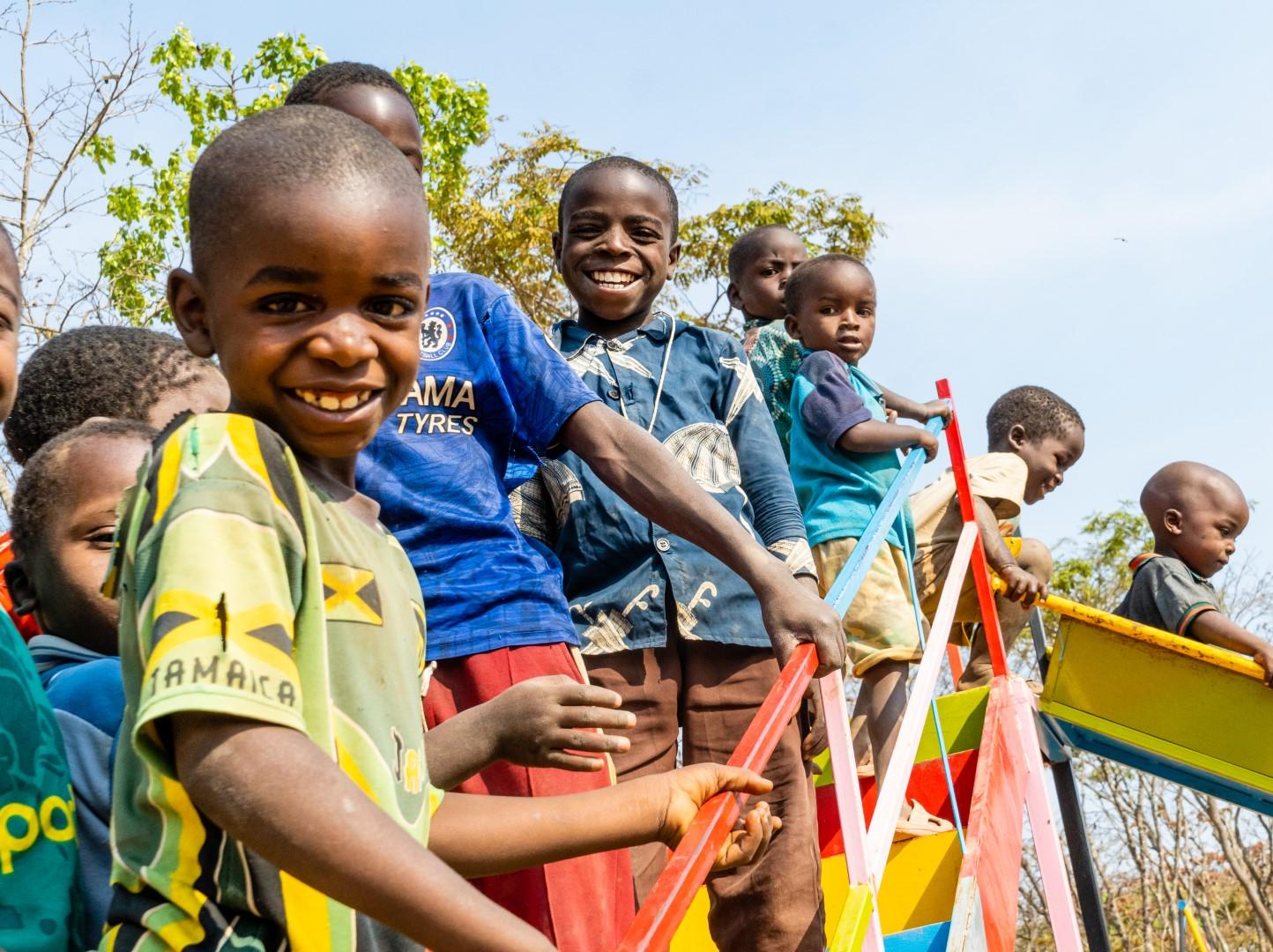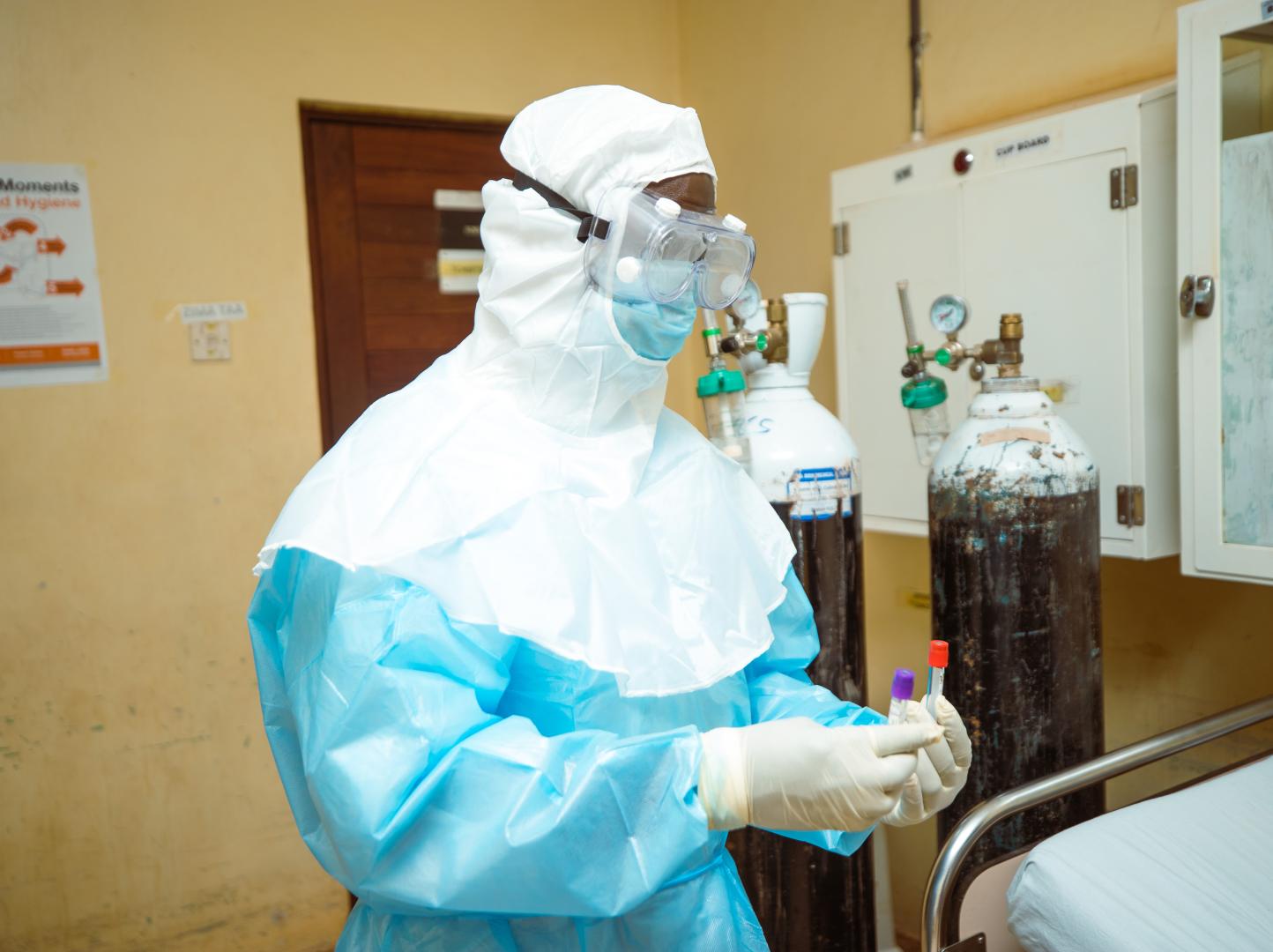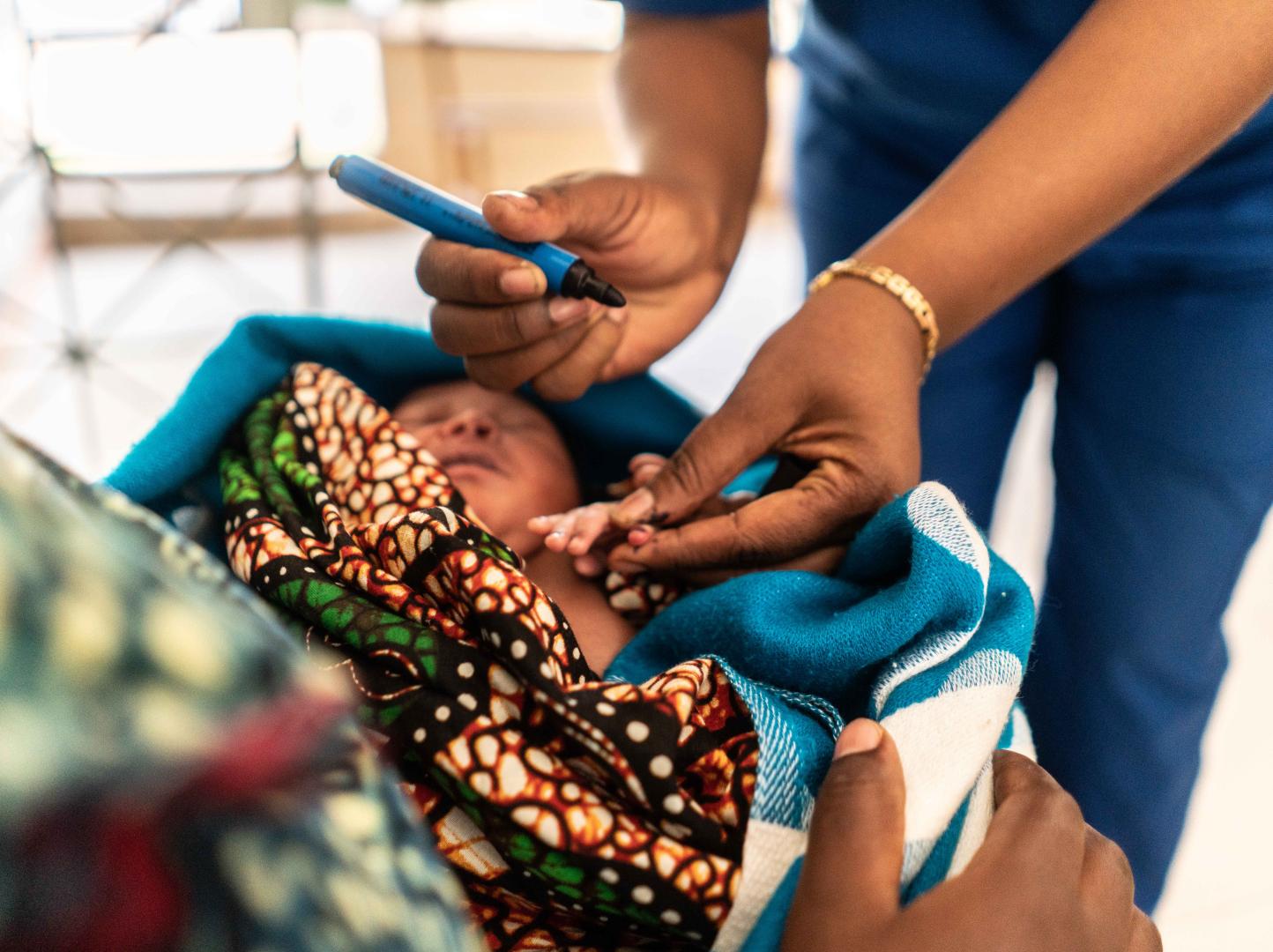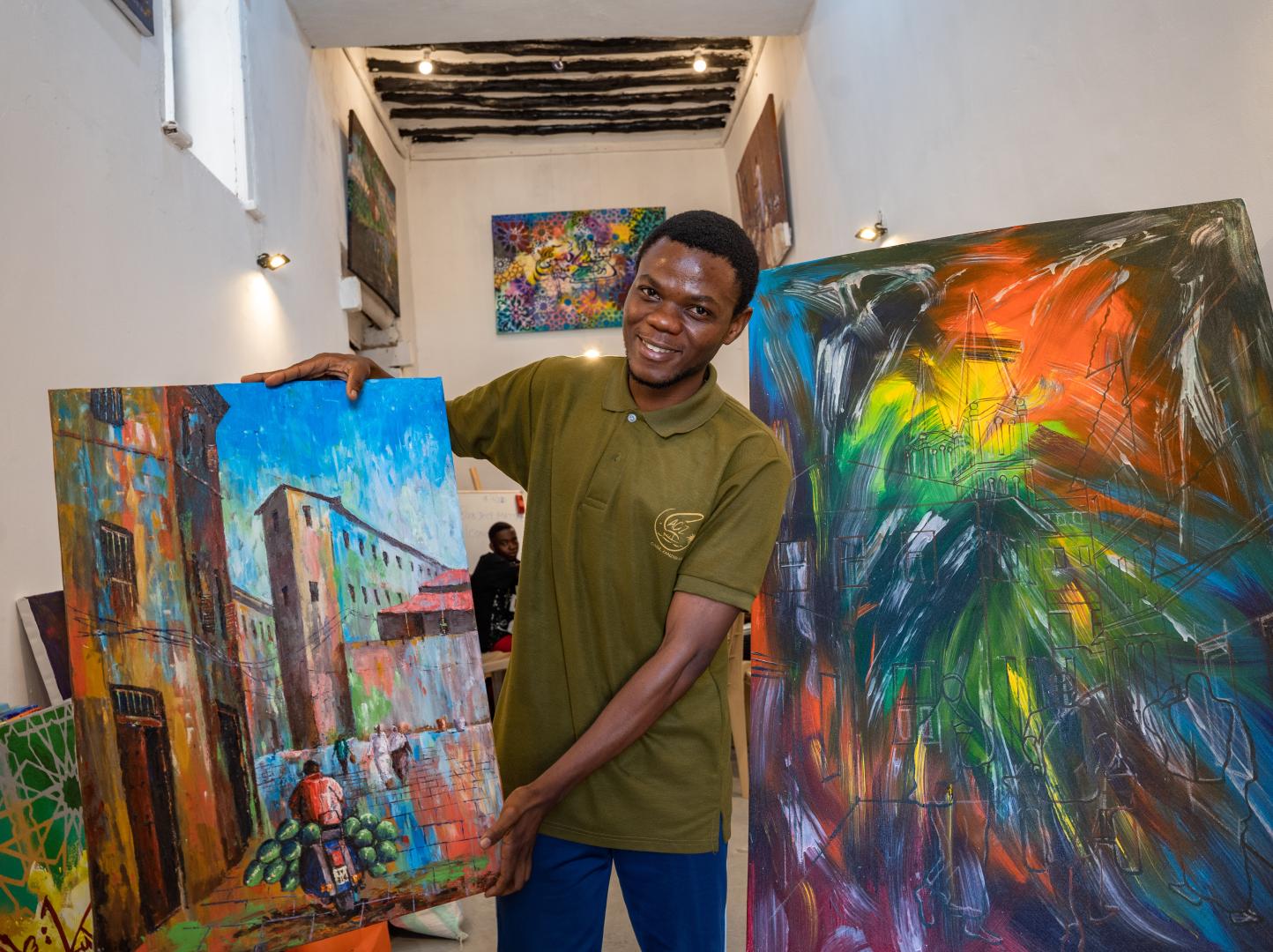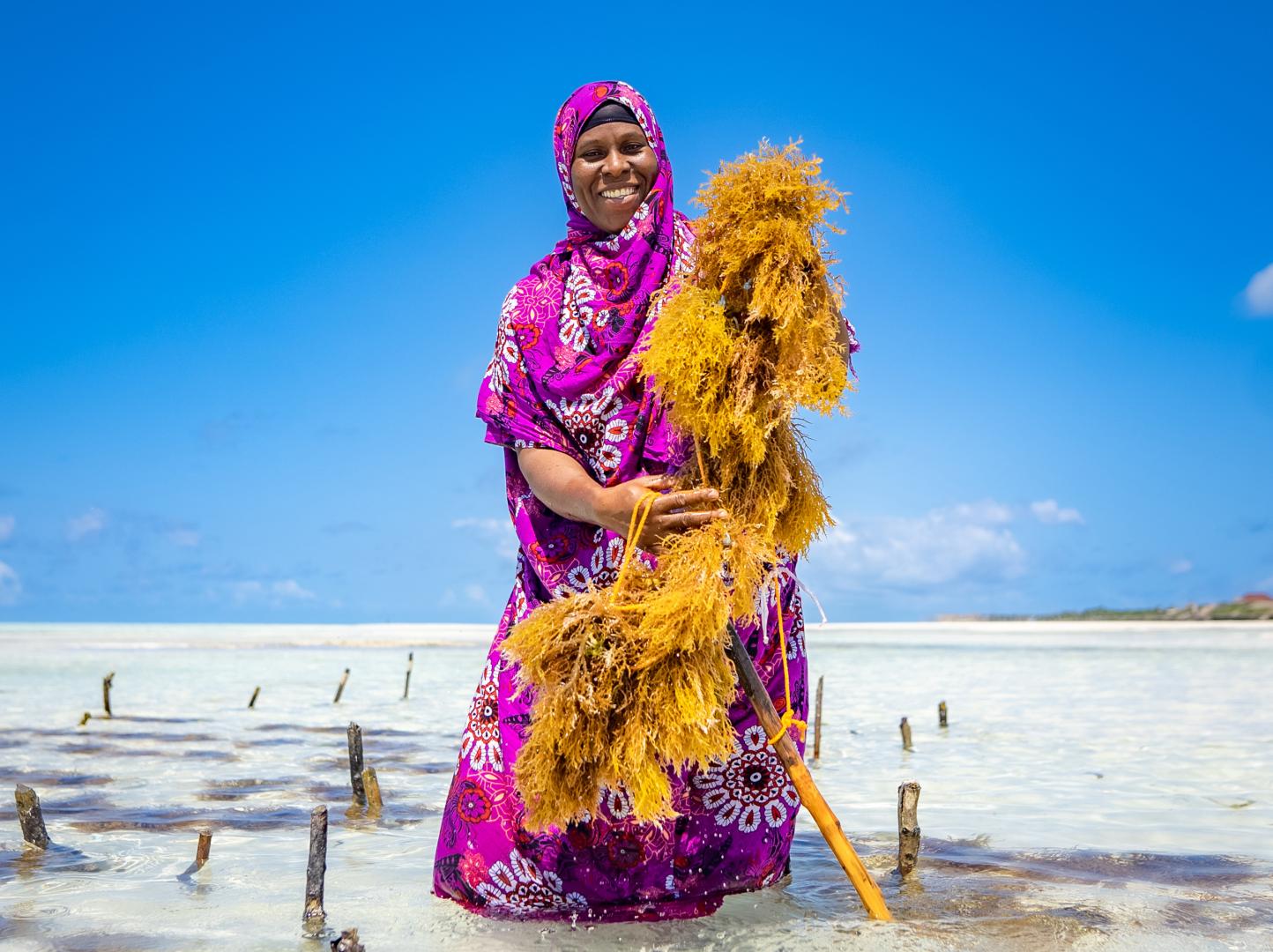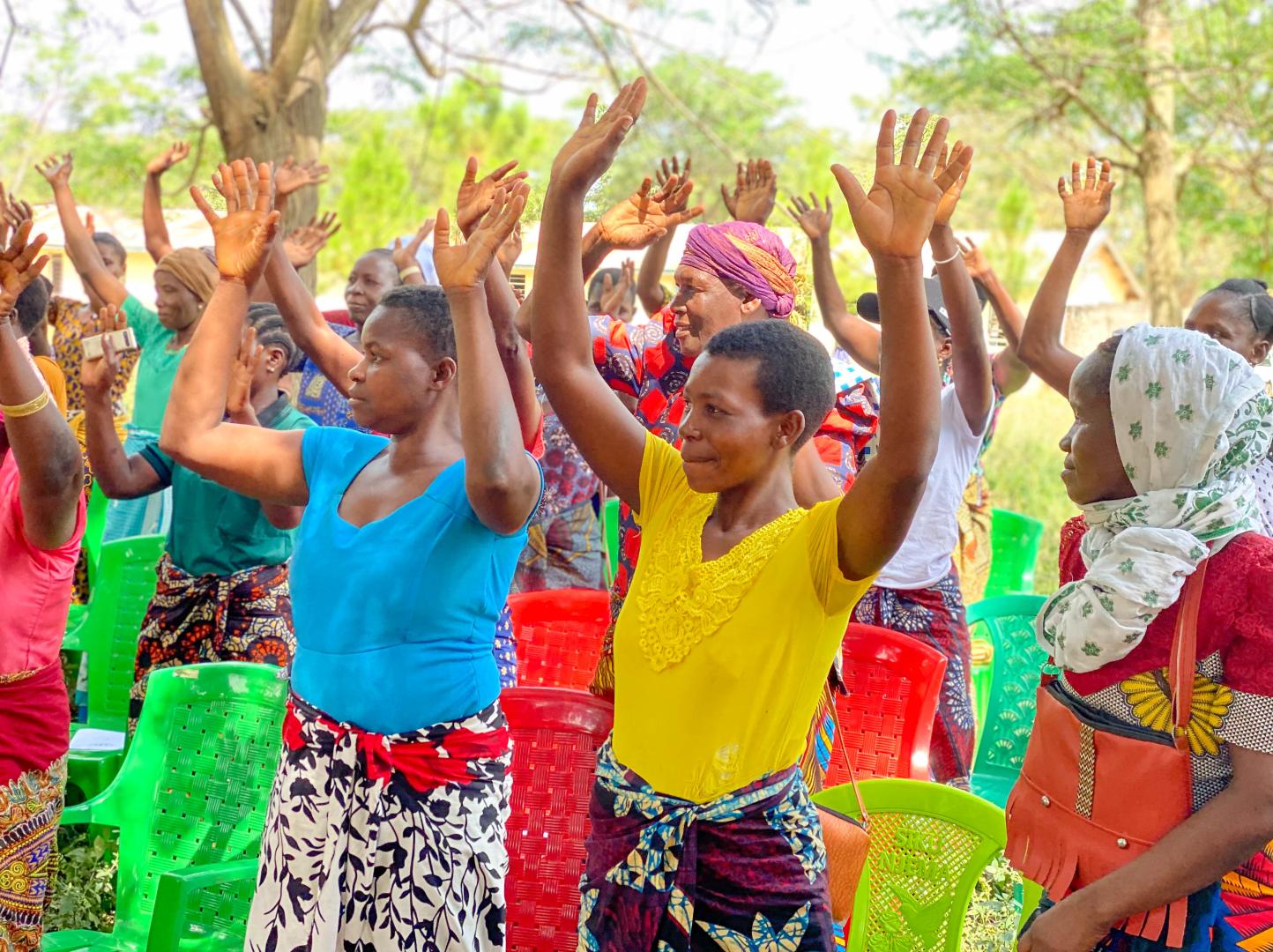Latest
Video
06 March 2024
The Secretary-General’s video message for International Women’s Day 2024
Learn more
Story
29 February 2024
The 18 Years-Old Girl, helping to end Gender-Based Violence, teenage pregrnancy, child marriage and Female Genital Mutilation (FGM) in her Community.
Learn more
Story
29 February 2024
Empowering Progress: Development Partner Unveils Transformative Impact in Kigoma
Learn more
Latest
The Sustainable Development Goals in Tanzania
The Sustainable Development Goals (SDGs) are a global call to action to end poverty, protect the earth’s environment and climate, and ensure that people everywhere can enjoy peace and prosperity. These are the goals the UN is working on in Tanzania:
Publication
14 March 2024
Annual Results Report 2022-2023
The United Nations System in Tanzania comprises 23 UN agencies that work closely with the Government and other stakeholders to support the achievement of national development priorities and the Sustainable Development Goals (SDGs). The UN uses its comparative advantage to promote policy coherence, leverage partnerships, foster learning in development, and enable the provision of quality services for the poorest and most vulnerable.The results from this report are coordinated efforts by UN agencies, funds, and programmes across the four outcome areas of our UN Sustainable Development Cooperation Framework (UNSDCF) 2022-2027.As we progress into the second year of the UNSDCF’s implementation, we are encouraged to report that we largely achieve our objectives in all four areas. We sincerely thank the Government, development partners, implementing partners, and the communities we serve for their enduring partnership and invaluable contribution to our mission.
1 of 5
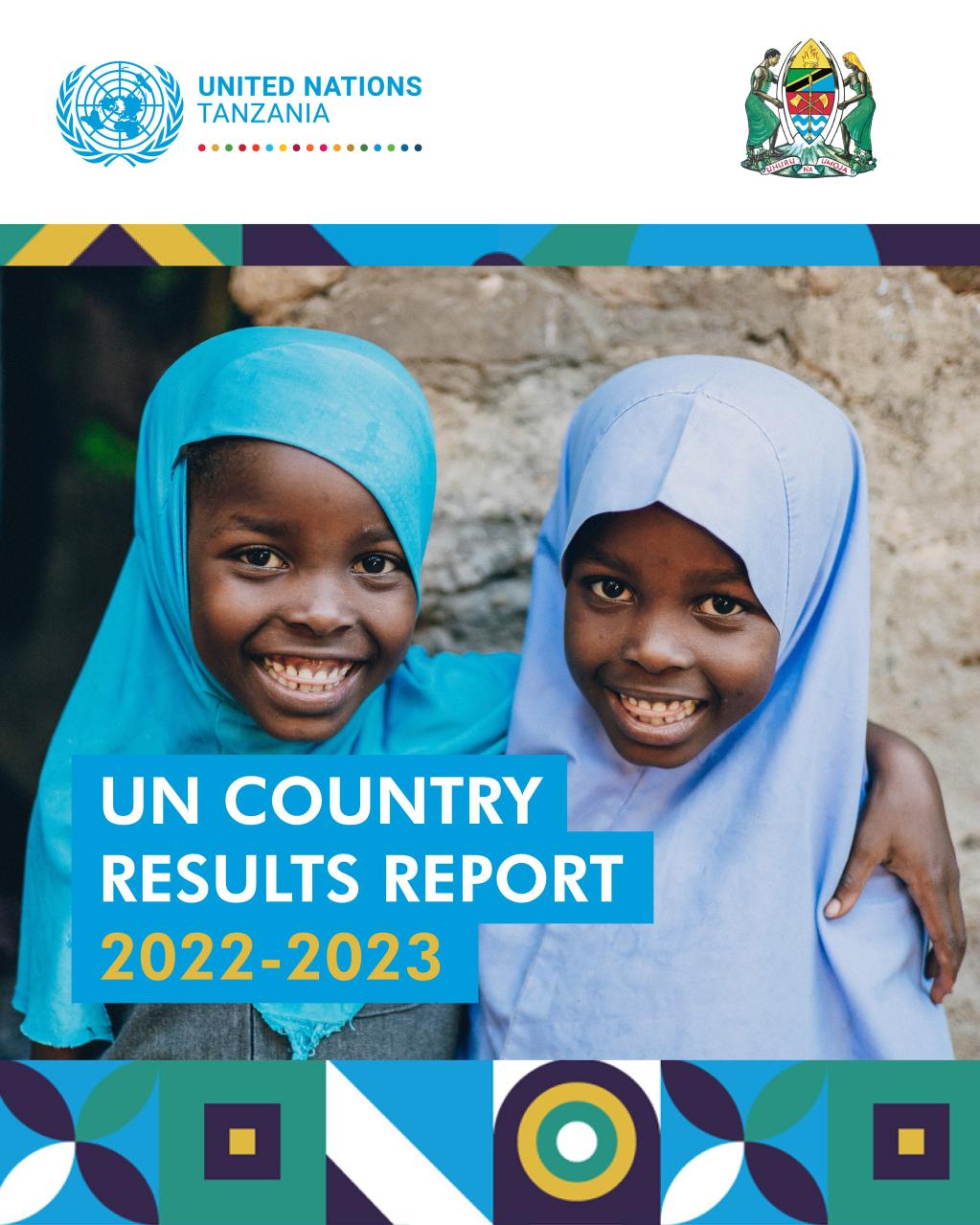
Publication
31 July 2023
Chasing Dreams, Creating Impact
Welcome to our coffee table book, a unique collection of human interest stories woven from the experiences of beneficiaries from the United Nations’ work in Tanzania. These stories, raw and powerful, serve as a testament to the transformative impact of our work and are an invitation to glimpse into the lives we touch every day.
This book is categorized according to the five ‘Ps’ of the Sustainable Development Goals (SDGs) – People, Prosperity, Planet, Peace, and Partnerships. These elements form the backbone of the United Nations’ approach to achieving a better and more sustainable future for all.
Each chapter explores stories under one of these thematic areas, showcasing how our initiatives, developed and implemented in partnership with the Tanzanian Government and communities, have led to meaningful changes.
As you turn the pages, you will meet individuals and communities who, with a helping hand from the UN and partners, have embraced challenges, turning them into opportunities, and are actively contributing to the broader vision of Tanzania’s development and the SDGs.
This coffee book is not just about the UN’s work; it is a celebration of the strength and spirit of the Tanzanian people. It is a tribute to the communities that we serve, who are the heroes of these narratives, continually inspiring us to strive for a world that leaves no one behind.
Welcome to their journey, and ours, towards a brighter, more equitable future.
1 of 5
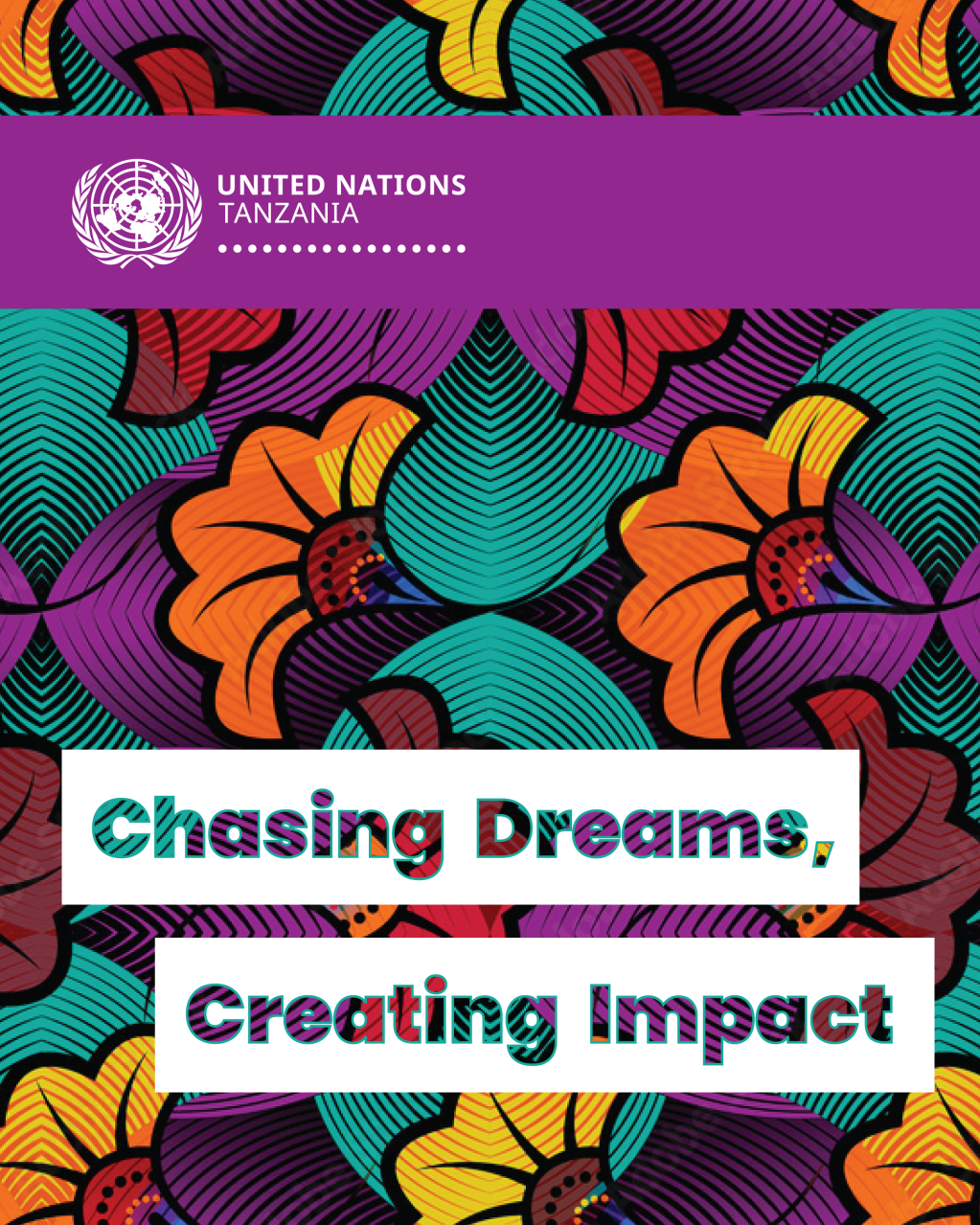
Publication
16 February 2024
UN Tanzania Key Developments (October - December 2023)
We're delighted to present an overview of some achievements and initiatives supported by the UN from October to December 2023. These achievements result from coordinated efforts by UN agencies, funds, and programmes across the four outcome areas of our UN Sustainable Development Cooperation Framework (UNSDCF) 2022-2027.
As we progress into the second year of the UNSDCF’s implementation, we are encouraged to report that we largely achieve our objectives in all four areas. We sincerely thank the Government, development partners, implementing partners, and the communities we serve for their enduring partnership and invaluable contribution to our mission.
1 of 5
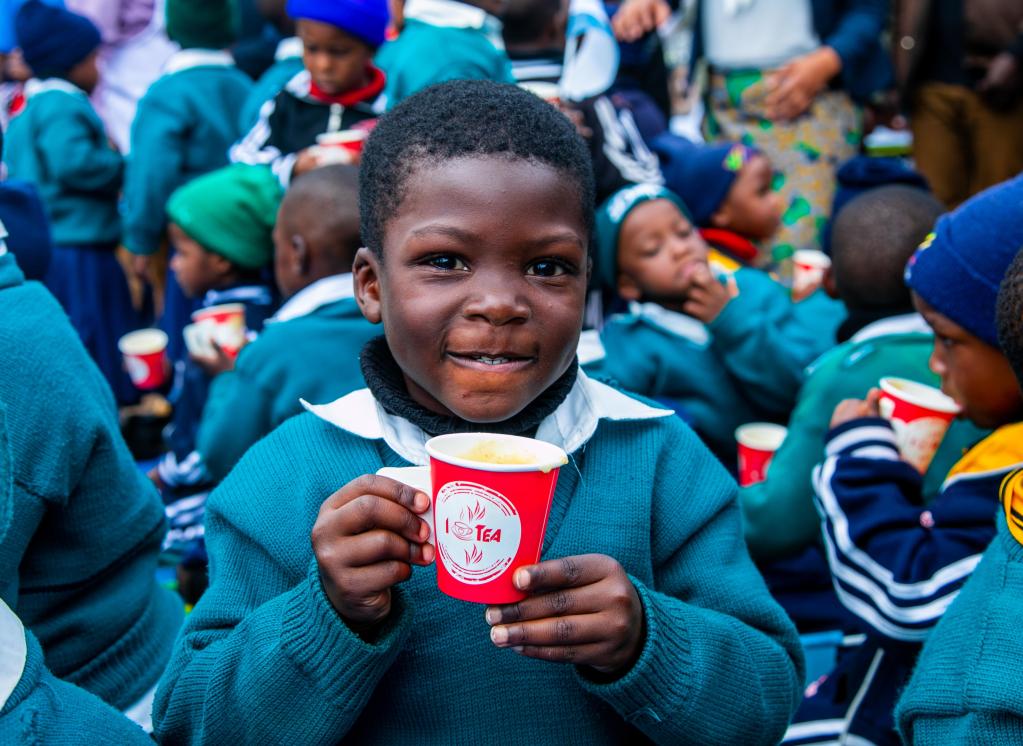
Publication
15 February 2023
Voices From the Field - KJP Special Edition
The programme builds upon the ongoing UN development interventions in the region. Through the KJP, the UN, therefore, continues to:
Implement an area-based cross-sectoral UN joint programme focused on addressing the root causes of poverty and human insecurity in all its dimensions to enhance the resilience and livelihood of communities living in Kigoma Region.
Apply a holistic durable approach to include both refugees, migrants in the region, host communities and host districts.
Implement the principles of the New Way of Working (NWOW) which encourages humanitarian and development agencies to work collaboratively based on their comparative advantages, towards ‘collective outcomes’ that reduce need, risk and vulnerability over multiple years.
Support the humanitarian-development nexus by linking together the UN’s existing response to refugees and migrants with an expanded development support to the host communities.
Support stability and prosperity in the Kigoma region, in turn, contributing to stability in the Great Lakes regional context.
1 of 5
Publication
20 July 2022
United Nations Sustainable Development Cooperation Framework (UNSDCF) - Brief
The United Nations (UN) system, in collaboration with the Government of the United Republic of Tanzania (GURT), presents the 2022-2027 United Nations Sustainable Development Cooperation Framework (UNSDCF) for Tanzania. It outlines a coherent plan of action and enables a coordinated UN response to contribute more efficiently and effectively to achieve the 2030 Agenda for Sustainable Development and the national development goals of the third National Five-Year Development Plan (FYDP III) and the 2021-2026 Zanzibar Development Plan (ZADEP). The framework also aims to contribute towards achieving Tanzania’s regional commitments and aspirations, including the East Africa Community Vision 2050 and the Africa Agenda 2063.
1 of 5
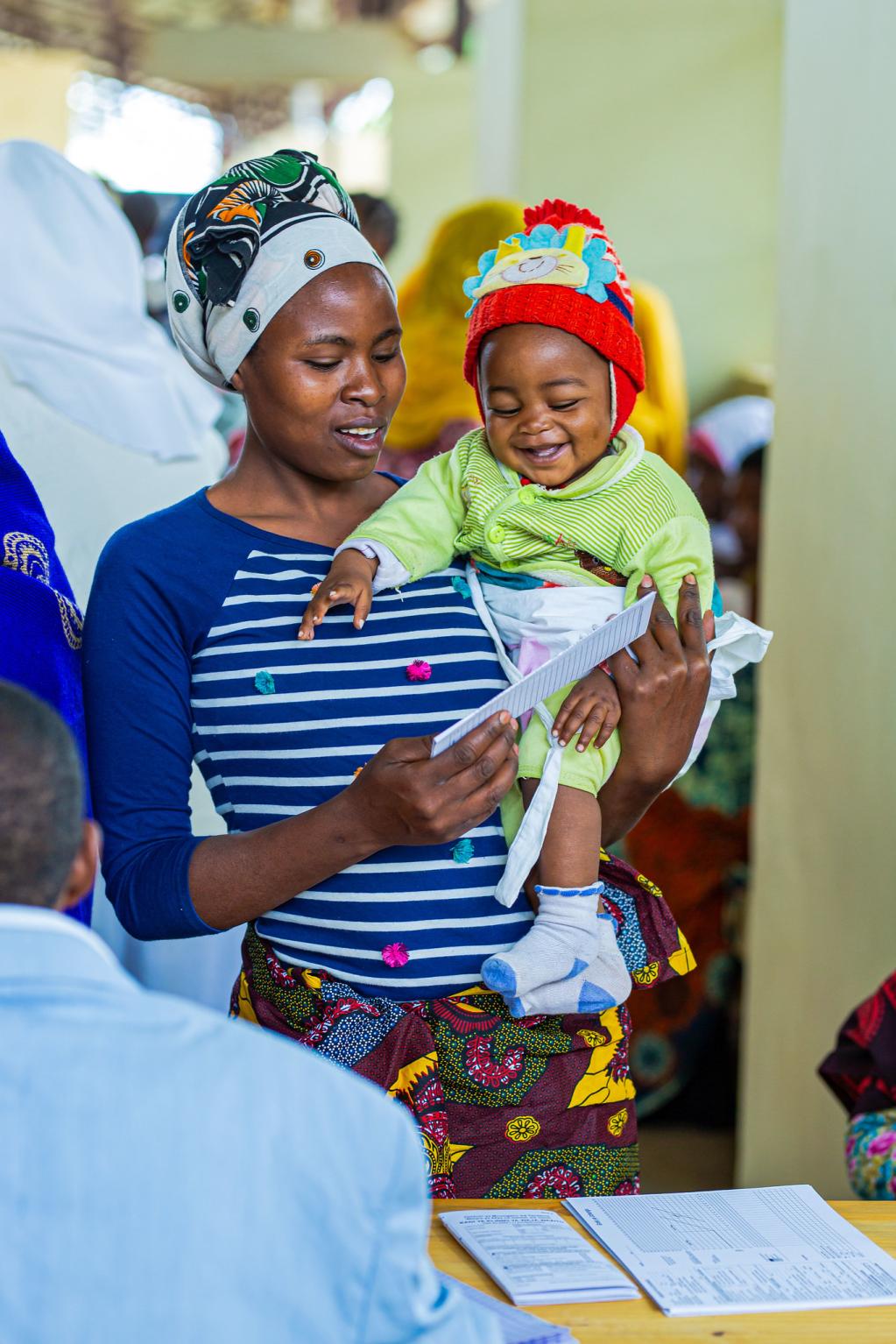
Story
29 February 2024
Empowering Progress: Development Partner Unveils Transformative Impact in Kigoma
In late January, the Embassy of Ireland conducted a visit to the Kigoma region to assess the progress of the Kigoma Joint Programme Phase II (KJP II) and monitor Ireland-funded development and humanitarian programmes in the Nduta refugee camp and host community. During their visit, they met with UN and Government programme officials and stakeholders to strengthen essential relationships that will contribute to improving the Kigoma region.While visiting the Nduta Refugee Camp, the mission members passed by the General Food Distribution Centre and Supplementary Feeding Programme, where they were informed that Burundian refugees face reduced rations at 60 per cent of the normal basket. During the courtesy call to the Ministry of Home Affairs, the Zonal Coordinator emphasised that the government of Tanzania is encouraging retraction of Burundian refugees, as the situation in Burundi is considered safe. After the refugee camp, the delegation proceeded to visit several developmental interventions in the host community and had the opportunity to speak with different beneficiaries. During the sessions with beneficiaries, the delegation realized the importance of beneficiary engagement in ensuring the effectiveness and sustainability of development initiatives, where they emphasized on the involvement of beneficiaries in the planning, implementation, and evaluation process to fosters a sense of ownership and empowerment within the community. The Embassy of Ireland’s visit to the Kigoma region concluded with a debriefing session where they shared their recommendations and forward-looking commitments, highlighting the importance of the field missions and beneficiary engagement, market-driven approaches, and thematic integration in programming for broader impact of the Kigoma Joint Programme. The joint mission by the Embassy of Ireland accompanied by UN and Government officials demonstrates a shared commitment to achieving sustainable development, leading to a brighter, more inclusive future for the people in Kigoma region.
1 of 5
Story
29 February 2024
The 18 Years-Old Girl, helping to end Gender-Based Violence, teenage pregrnancy, child marriage and Female Genital Mutilation (FGM) in her Community.
We know that when we empower girls, everybody benefits. Girls who are educated, healthy and free can transform their communities and pass on the benefits to their children, and to their children's children. Bhoke Shanalingigwa, an 18-years-old girl from a village called Masanga in Tarime, Mara Region, Tanzania, has been working hard to eradicate gender-based violence (GBV), teenage pregnancy, child marriage and female genital mutilation (FGM) in her community. Bhoke, who lives with her mother and two siblings, is in her third year of secondary school. Growing up, she saw women and girls in her community held back by FGM, GBV, child marriage and teenage pregnancy. “If only we had a community free from gender-based violence, teenage pregnancy, child marriage and female genital mutilation, then all girls would be able to achieve their dreams”. Said Bhoke ShanalingigwaBhoke wanted to do something to defend their dignity, health, rights and choices. She met Bernard Chacha in 2022. Bernard was a young volunteer working with the Association for the Termination of FGM (ATFGM), supported by UNFPA as a long-standing partner. Since 2022, UNFPA’s support to ATFGM has been through the Chaguo Langu Haki Yangu: My Choice, My Rights programme, funded by the Government of Finland. Within this programme Bernard works with young people aged 15-24, to empower them with information and skills to raise awareness about women and girls’ rights, including on the right to a life free of violence, sexual and reproductive health, stigma and discrimination, including toward women and girls with disabilities,and to influence the implementation of Tanzanian government policies in their communities. These young people also work together to hold decision-makers to account on their commitments to advance gender equality in the United Republic of Tanzania.“The Chaguo Langu Haki Yangu programme taught me about girls’ rights and how to stand for my rights, and that gender-based violence is a violation of human rights. It also helps me make safe decisions about my sexual health”. Said Bhoke Shanalingigwa.Bhoke worked with Bernard Chacha to organise a school outreach campaign in November 2022 during the 16 Days of Activism, an annual campaign that puts spotlight on issues related to gender equality and promotes dialogues towards ending violence against women and girls. The outreach was all about ending GBV, teenage pregnancy, child marriage and FGM. Working together, Bhoke and Bernard conducted a two-day training at her school and reached 150 students. After this success, Bhoke wanted to ensure that the education continued, so she started a weekly gender club in her school to share her knowledge with other young people both in and out of school. Becoming a leader in her communityThanks to her proactive approach Bhoke has become a community leader and has empowered other girls to seek help, end abuses and claim their rights. Through her engagement with other young people in the gender clubs, one of the students, Tomondo told her about some unwanted sexual experiences from a family member she had been subjected to in her home and Bhoke convinced her to report the incident to the local authorities. “I informed Tomondo about her rights, and built her confidence to report her case to the police She agreed to report her abuser, who was arrested. Now the case is in the hands of the local government authorities”. Said Bhoke.Bhoke is happy to see that through the knowledge she got from the Chaguo Langu Haki Yangu programme, she is making a difference in her community. She hopes that addressing GBV will help them all to fulfill their dreams. As for her own dreams, Bhoke hopes to become a doctor someday, so she can continue her support to protect the lives of women and girls and promote their rights to health and protection.The ‘My Rights My Choices’ is a three-and-a-half-year programme (2021-2025) implemented by UNFPA, the United Nations sexual and reproductive health agency, in partnership with the Embassy of Finland in Tanzania. The programme’s goals are to ensure that the rights and choices of women and girls, particularly women and girls with disabilities, are protected and enhanced through a multi-sectoral and holistic response that tackles gender-based violence (GBV) and harmful practices, including teenage pregnancy, child marriage and female genital mutilation (FGM). The programme is implemented as part of activities to realize the National Plans of Action to End Violence Against Women and Children (NPA-VAWC) in Mainland Tanzania (2016/17-2021/22) and Zanzibar (2017-2022).Direct beneficiaries: Adolescent girls and young women, particularly women and girls with disabilities, living in Shinyanga (Kishapu and Kahama districts) and Mara Regions (Tarime and Butiama districts) and Zanzibar (Urban district in Unguja and Chake Chake district in Pemba) who are vulnerable to or survivors of GBV, FGM and early and child marriage. Indirect beneficiaries: Affected families, targeted communities and government institutions whose capacities will be strengthened to prevent and respond to GBV, FGM, teenage pregnancy and child marriage and to uphold the rights of women and girls, particularly women and girls with disabilities.The programme is enhancing coordination, knowledge- sharing and policy development to support the implementation of the NPA-VAWC in Mainland Tanzania and Zanzibar, in collaboration with the Government of the United Republic of Tanzania, including local government authorities.According to the recently released Tanzania Demographic and Health Survey from 2022, the prevalence of Intimate Partner Violence (Physical, Sexual or Emotional) in Mara region declined from 76% to 66%, while the FGM prevalence declined from 32% to 28% and teenage pregnancy declined from 37% in 2015/16 to 31% in 2022 . The prevalence of young women aged 20-24 years who reported being married by age 18 remained unchanged at 38% during the same period. NB* Names are changed.
1 of 5
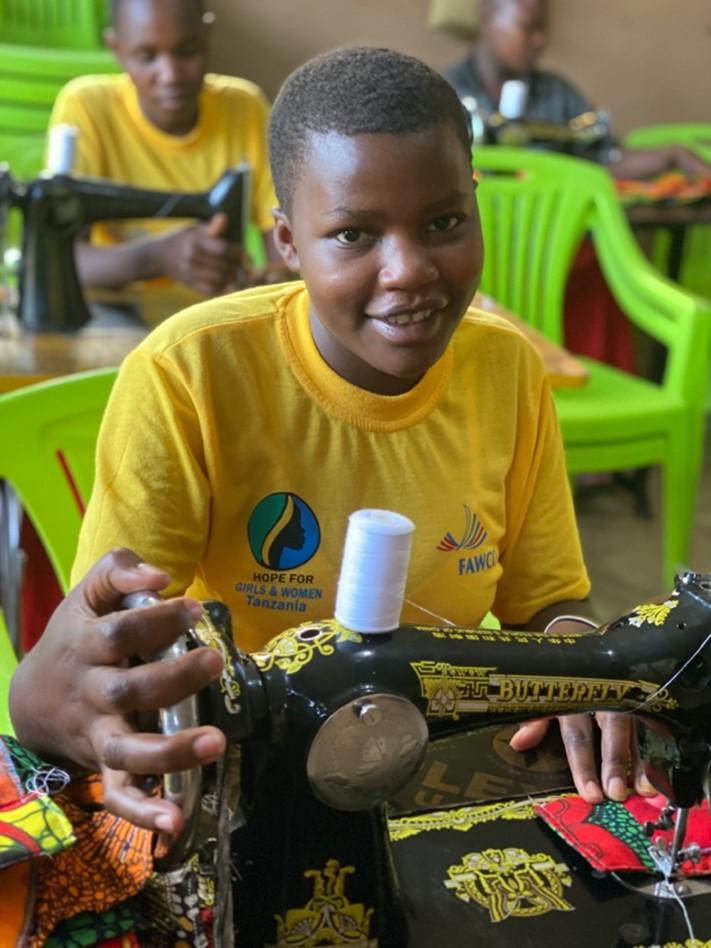
Story
29 February 2024
Disability is not Inability: An Inspiring Story from Nchagwa Matiko
Nchagwa Matiko (not her real name) is a 17-year-old girl studying in secondary school in form three. She was born without disability in a farming family that lives in Tarime town council. Sadly, at the age of one year and six months, she contracted malaria. During treatment, her right leg was paralysed a few days after receiving an injection. Her parents managed to get further treatment for the leg, but it took three months, and although the leg recovered, it was bent and made Nchagwa disabled. The father abandoned the family and married another woman soon after Nchagwa’s final treatment because he could not accept having a child with a disability as it was a sign of a ‘curse’. The abandonment by her father and frequent rebuke from her father's relatives mentally tortured her, and she often blamed herself for her father leaving the family. Nchagwa also experienced stigma and discrimination from her community due to her disability, which made her feel discouraged and rejected.“I felt like I am not a human being from how my relatives mistreated me,” Nchagwa said. Despite the challenges, she completed and passed her primary education and continued with secondary education under her mother’s care. At her school, Nchagwa received psychosocial support, counselling and guidance from the child rights club and the club teacher through the Chaguo Langu Haki Yangu - ‘My Rights My Choices’ programme, funded by the Government of Finland and implemented by UNFPA in partnership with ATFGM Masanga in Mara region. The child rights clubs promote empowerment to children in school to know their rights and facilitate them to enjoy their childhood and reach their full potential through promoting an enabling school environment. The teachers who run the clubs are trained by the district social welfare officer for three days using a government guideline on forming the clubs in and out of school. Through the clubs, children like Nchagwa receive life skills education, including information about puberty and how to engage with friends. This gives them the confidence to express their ideas and discuss challenges in the community, family and even in schools. Also, children are encouraged to report to the Child Helpline #116 if they experience any challenge of gender-based violence, child marriage and female genital mutilation. With support from the child rights club coordinator and club teacher, Nchagwa became friends with other children within the club, who saw her rich talent for singing and drawing. Nchagwa commended the child rights club, “I’m grateful that before joining the club, I was not confident enough to socialise with other children in activities such as singing, playing, and acting in drama. I am grateful for the peace and joy brought into my heart by the Chaguo Langu Haki Yangu programme through support from the child rights clubs. The psychosocial and counselling support from the child rights club at school has made me feel I am not different from other children without disabilities.”Since Nchagwa joined the club, she has progressed well with her secondary education and is fully active in the club activities. She can confidently speak before other club members and other children in school and is involved in raising awareness of children’s rights, especially children with disabilities. Through the club, she has also become aware of female genital mutilation and how it negatively affects girls' physical and psychological health throughout their lives. She is courageous enough to raise awareness of child abuse and other forms of gender-based violence among her fellow children with disabilities.Nchagwa gave thoughtful advice, “Ignorance is a disease in the community, and it can be cured by gaining knowledge. I am expecting to educate the community about all harmful beliefs and behaviour towards children, including children with disabilities.”Speaking about her future, Nchagwa is optimistic about becoming an artist and a role model to other children with disabilities to empower them to follow their passions and not hesitate to explore their talents. Nchagwa’s mother has set up a small shop business that continues to enable her to provide for her children's basic needs. Nchagwa’s mother appreciated the courage her daughter acquired through the Chaguo Langu Haki Yangu programme supporting school clubs and reports, “My daughter used to be very shy and isolated; however, this has changed after the support from the child rights clubs. Nchagwa now interacts well with her peers and has made many friends.”Chaguo Langu Haki Yangu - ‘My Rights My Choices’ is a three-and-a-half-year programme (2021-2025) implemented by UNFPA, the United Nations Sexual and Reproductive Health agency, with funding from the Government of Finland. The programme’s goals are to ensure that the rights and choices of women and girls, particularly women and girls with disabilities, are protected and enhanced through a multi-sectoral and holistic response that tackles gender-based violence and harmful practices, including teenage pregnancy, child marriage and female genital mutilation. The programme is implemented as part of activities to realise the National Plans of Action to End Violence Against Women and Children (NPA-VAWC) in Mainland Tanzania (2016/17-2021/22) and Zanzibar (2017-2022).Direct beneficiaries: Adolescent girls and young women, particularly women and girls with disabilities, living in Shinyanga (Kishapu and Kahama districts) and Mara Regions (Tarime and Butiama districts) and Zanzibar (Urban district in Unguja and Chake Chake district in Pemba) who are vulnerable to or survivors of GBV, FGM and early and child marriage. Indirect beneficiaries: Affected families, targeted communities and government institutions whose capacities will be strengthened to prevent and respond to gender-based violence and harmful practices, including teenage pregnancy, child marriage and female genital mutilation, and to uphold the rights of women and girls, particularly women and girls with disabilities.The programme is enhancing coordination, knowledge-sharing and policy development to support the implementation of the NPA-VAWC in Mainland Tanzania and Zanzibar in collaboration with the Government of the United Republic of Tanzania, including local government authorities.According to the recently released Tanzania Demographic and Health Survey from 2022, the prevalence of Intimate Partner Violence (Physical, Sexual or Emotional) in Mara region declined from 76% to 66%, while the FGM prevalence declined from 32% to 28%. Teenage pregnancy fell from 37% in 2015/16 to 31% in 2022. The prevalence of women aged 20-24 who reported being married by age 18 remained unchanged at 38% during the same period. NB* Names are changed. Photos are not related to the Storyteller.
1 of 5
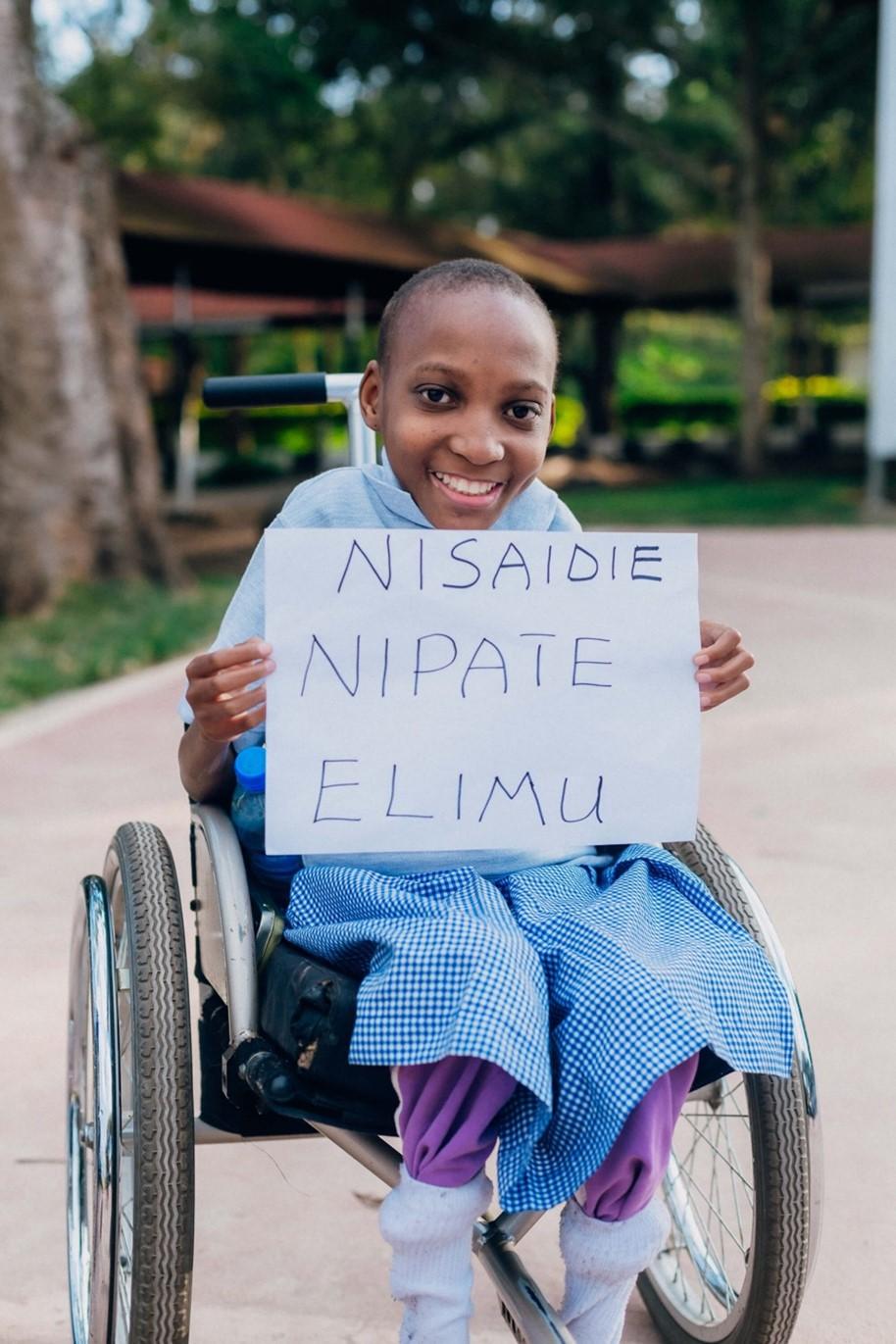
Story
19 February 2024
The 18 Years-Old Girl, helping to end Gender-Based Violence, teenage pregrnancy, child marriage and Female Genital Mutilation (FGM) in her Community.
We know that when we empower girls, everybody benefits. Girls who are educated, healthy and free can transform their communities and pass on the benefits to their children, and to their children's children. Bhoke Shanalingigwa, an 18-years-old girl from a village called Masanga in Tarime, Mara Region, Tanzania, has been working hard to eradicate gender-based violence (GBV), teenage pregnancy, child marriage and female genital mutilation (FGM) in her community. Bhoke, who lives with her mother and two siblings, is in her third year of secondary school. Growing up, she saw women and girls in her community held back by FGM, GBV, child marriage and teenage pregnancy.
“If only we had a community free from gender-based violence, teenage pregnancy, child marriage and female genital mutilation, then all girls would be able to achieve their dreams”. Said Bhoke Shanalingigwa
Bhoke wanted to do something to defend their dignity, health, rights and choices. She met Bernard Chacha in 2022. Bernard was a young volunteer working with the Association for the Termination of FGM (ATFGM), supported by UNFPA as a long-standing partner. Since 2022, UNFPA’s support to ATFGM has been through the Chaguo Langu Haki Yangu: My Choice, My Rights programme, funded by the Government of Finland. Within this programme Bernard works with young people aged 15-24, to empower them with information and skills to raise awareness about women and girls’ rights, including on the right to a life free of violence, sexual and reproductive health, stigma and discrimination, including toward women and girls with disabilities,and to influence the implementation of Tanzanian government policies in their communities. These young people also work together to hold decision-makers to account on their commitments to advance gender equality in the United Republic of Tanzania.
“The Chaguo Langu Haki Yangu programme taught me about girls’ rights and how to stand for my rights, and that gender-based violence is a violation of human rights. It also helps me make safe decisions about my sexual health”. Said Bhoke Shanalingigwa.
Bhoke worked with Bernard Chacha to organise a school outreach campaign in November 2022 during the 16 Days of Activism, an annual campaign that puts spotlight on issues related to gender equality and promotes dialogues towards ending violence against women and girls. The outreach was all about ending GBV, teenage pregnancy, child marriage and FGM. Working together, Bhoke and Bernard conducted a two-day training at her school and reached 150 students. After this success, Bhoke wanted to ensure that the education continued, so she started a weekly gender club in her school to share her knowledge with other young people both in and out of school.
Becoming a leader in her community
Thanks to her proactive approach Bhoke has become a community leader and has empowered other girls to seek help, end abuses and claim their rights. Through her engagement with other young people in the gender clubs, one of the students, Tomondo told her about some unwanted sexual experiences from a family member she had been subjected to in her home and Bhoke convinced her to report the incident to the local authorities.
“I informed Tomondo about her rights, and built her confidence to report her case to the police She agreed to report her abuser, who was arrested. Now the case is in the hands of the local government authorities”. Said Bhoke.
Bhoke is happy to see that through the knowledge she got from the Chaguo Langu Haki Yangu programme, she is making a difference in her community. She hopes that addressing GBV will help them all to fulfill their dreams. As for her own dreams, Bhoke hopes to become a doctor someday, so she can continue her support to protect the lives of women and girls and promote their rights to health and protection.
The ‘My Rights My Choices’ is a three-and-a-half-year programme (2021-2025) implemented by UNFPA, the United Nations sexual and reproductive health agency, in partnership with the Embassy of Finland in Tanzania. The programme’s goals are to ensure that the rights and choices of women and girls, particularly women and girls with disabilities, are protected and enhanced through a multi-sectoral and holistic response that tackles gender-based violence (GBV) and harmful practices, including teenage pregnancy, child marriage and female genital mutilation (FGM). The programme is implemented as part of activities to realize the National Plans of Action to End Violence Against Women and Children (NPA-VAWC) in Mainland Tanzania (2016/17-2021/22) and Zanzibar (2017-2022).
Direct beneficiaries: Adolescent girls and young women, particularly women and girls with disabilities, living in Shinyanga (Kishapu and Kahama districts) and Mara Regions (Tarime and Butiama districts) and Zanzibar (Urban district in Unguja and Chake Chake district in Pemba) who are vulnerable to or survivors of GBV, FGM and early and child marriage. Indirect beneficiaries: Affected families, targeted communities and government institutions whose capacities will be strengthened to prevent and respond to GBV, FGM, teenage pregnancy and child marriage and to uphold the rights of women and girls, particularly women and girls with disabilities.
The programme is enhancing coordination, knowledge- sharing and policy development to support the implementation of the NPA-VAWC in Mainland Tanzania and Zanzibar, in collaboration with the Government of the United Republic of Tanzania, including local government authorities.
According to the recently released Tanzania Demographic and Health Survey from 2022, the prevalence of Intimate Partner Violence (Physical, Sexual or Emotional) in Mara region declined from 76% to 66%, while the FGM prevalence declined from 32% to 28% and teenage pregnancy declined from 37% in 2015/16 to 31% in 2022 . The prevalence of young women aged 20-24 years who reported being married by age 18 remained unchanged at 38% during the same period.
NB* Names are changed.
1 of 5
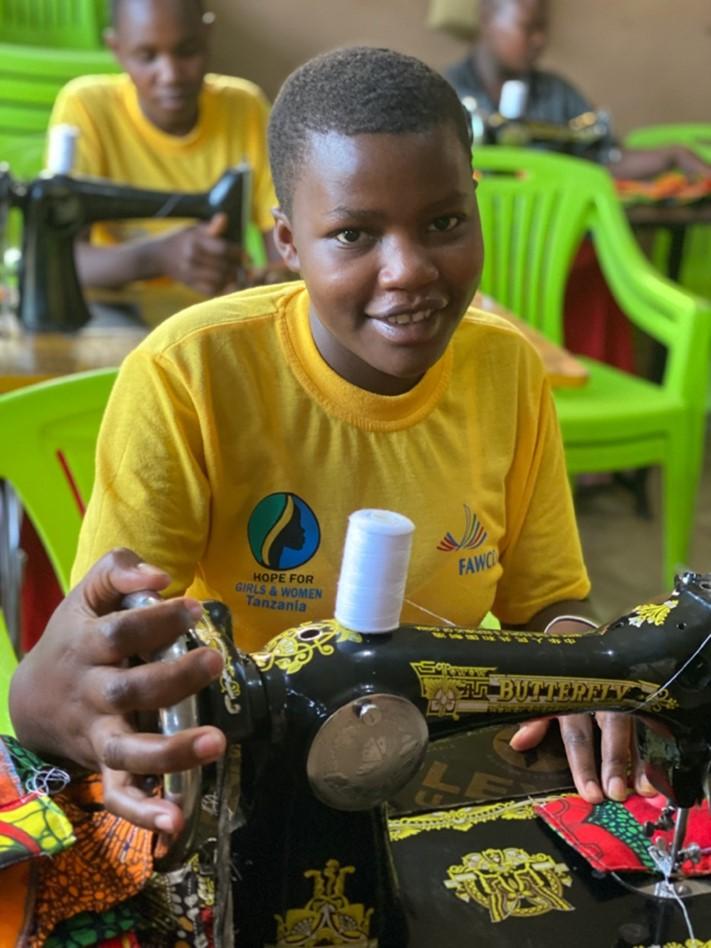
Story
19 February 2024
Investing in green charcoal: A Practical Solution for Cleaner Cooking
Data from the Tanzania Forestry Agency (TFS) shows that Dar es Salaam residents use over 500,000 bags of charcoal per month while Mwanza and Arusha use up to 200,000 bags. The good news is that there is a push for a migration from traditional wood charcoal and firewood to the use of briquettes, an eco-friendly alternative that promises not only efficient cooking but also a healthier environment.
Leonard Gabriel Kushoka, Director of Kuja-na-kushoka Tools and Manufacturers, echoes the sentiments of many driving this transformation. His journey into the briquette business began out of a desire to offer an alternative to traditional charcoal driven by concerns about the destructive impact of charcoal production on the environment. Starting as a mechanical workshop tool manufacturer, he ventured into briquette production in 2016, leveraging his mechanical experience to create briquette-making machines and even winning recognition in the Alternative Charcoal Energy Technology Competition in 2018.
Abdulkher Mohamed, the Director of Alladin Limited Company, offers a unique perspective from the sales side of the briquette industry. Specializing in the production and sale of briquettes made from materials such as sawdust, coconut shells, rice husks and others. His journey began with learning about the briquette business in Nairobi, Kenya and further education from the Tanzania Industrial Research and Development Organization (TIRDO). Established in 2019, his company primarily markets its products in the commercial city of Dar-es-Salaam and the nation’s capital city Dodoma. He distributes to other regions in Tanzania through individual buyers.
Benefits of briquettes
One of the primary advantages of briquettes is their ability to offer cleaner energy while using fewer raw materials compared to traditional charcoal. This reduction in material usage not only makes the shift from charcoal usage easier but also proves beneficial in urban areas where charcoal may be pricier due to transportation costs and scarcity.
Kushoka notes that urban areas, such as Dar-es-Salaam, demonstrate a better market for briquette-making machines due to their affordability and accessibility in contrast to the higher costs of traditional charcoal, driven by increased transportation costs and limited availability. This is especially true for business owners who rely on cooking as their source of income. He also believes that in rural parts of Tanzania, the abundance of trees poses a challenge to enforcing environmental laws so many people in those areas opt to use firewood.
The environmental benefits of briquettes also stand out because production is less harmful to the environment compared to the traditional charcoal production process.
Challenges and the path forward
The lack of widespread awareness about the benefits of briquettes impedes the migration process. Kushoka and his team have taken proactive steps to solve this by utilizing social media, exhibitions, and direct engagement with buyers to educate them on the benefits of this cleaner cooking solution. Mohamed expressed that though many of his customers are keen to try briquettes they are not repeat clients because of a lack of awareness.
The absence of substantial government support and minimal policy backing presents hurdles. Stringent regulations on briquette production increase operational costs and in turn the price of the product.
While there's advocacy for the shift to briquettes, the absence of direct government support hampers the migration progress. Government intervention would help increase the use of such products and reduce the preference for charcoal. In April 2023, the Government through the Office of the Vice President directed that all public and private institutions in Tanzania serving food to over 100 people per day should cease the use of firewood and charcoal by the end of January 2023, while those serving over 300 people have until the end of January 2025. Kushoka uses this directive to advertise his business. However, he says there has not been much follow-through since that announcement.
Additionally, Tanzania faces a technological gap in advanced machinery necessary for efficient briquette production, trailing behind neighbouring countries like Kenya. Furthermore, a lack of industry awareness complicates efforts to convince potential customers to embrace this cleaner cooking alternative.
A call for education and change:
Both Mohamed and Kushoka highlight that the deeply ingrained use of traditional charcoal within Tanzanian culture poses a significant challenge in the migration from charcoal to briquettes.
In the words of Kushoka, "Matumizi ya mkaa ni tamaduni, elimu inahitajika ili kuwatoa watu kwenye hiyo mindset." This insightful statement underscores the necessity for education to shift people’s mindsets away from traditional charcoal use towards adopting cleaner, sustainable alternatives.
The transition from traditional wood charcoal to greener briquettes holds promise for a cleaner and more sustainable future. It is a journey filled with challenges, yet it’s a path that promises a healthier environment, reduced ecological impact, and improved well-being for individuals. As awareness spreads and support grows, the potential for a shift towards briquettes as a practical solution for cleaner cooking becomes more evident.
1 of 5
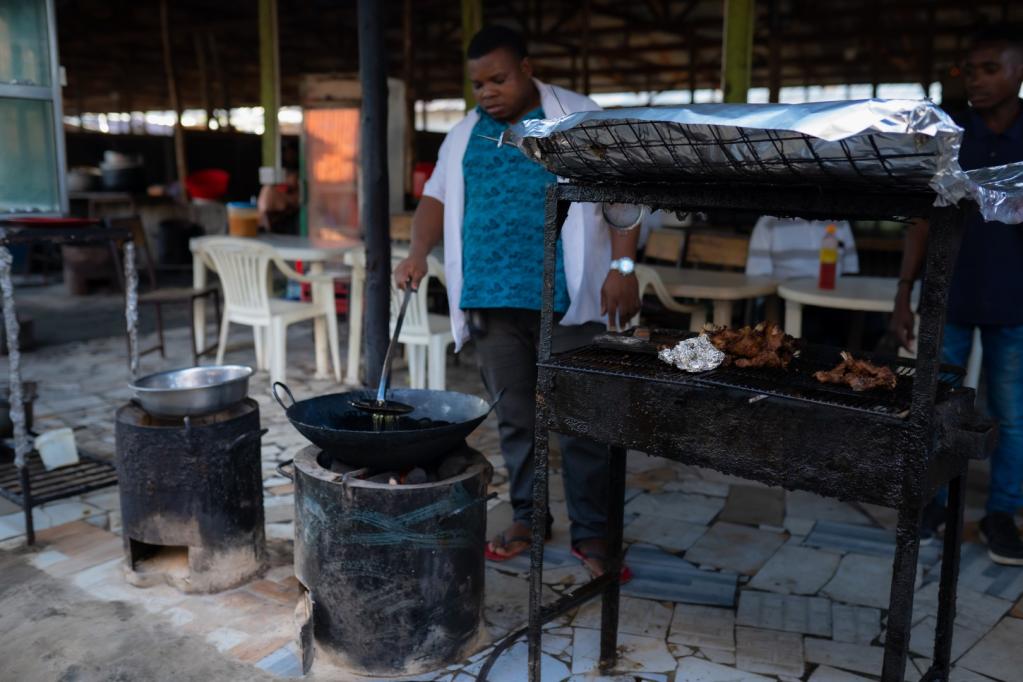
Press Release
12 February 2024
Japan and UNHCR sign $360,000 agreement for emergency assistance for Congolese new arrivals in Tanzania
“While Japan, together with UNHCR, will make efforts to support Tanzania, I sincerely hope that the government of Tanzania will also continue playing an important role to provide protection as well as the necessary care to refugees in accordance with international humanitarian laws. By working together, we can make a tangible impact on the lives of refugees, ensuring a brighter and more secure future,” said H.E Mr. Yasushi Misawa, Ambassador of Japan to Tanzania.
In 2023, UNHCR and its national and international partners supported the Government of the United Republic of Tanzania to receive over 14,400 new arrivals in Kigoma region who were provided with a safe place to sleep, food, water, and other life-saving assistance. Often refugees and forcibly displaced people who flee arrive with little more than the clothes they are wearing and the few belongings they can carry in their arms. Access to shelter, water, sanitation facilities, and essential items for hygiene promotion becomes vital to reducing mortality and morbidity, and enhancing new arrivals’ protection, dignity, and quality of life.
“Last year, I was in Kigoma and in Nyarugusu refugee camp where I spoke to men, women, and children who fled from the DRC. They were people like you and me, desperate, crying for their dead and missing family, friends, and neighbours. The very timely contribution from Japan will allow us to help refugees live dignified lives in displacement,” said Ms. Mahoua Parums, UNHCR’s Representative in Tanzania.
UNHCR requires USD 8 million to respond to the DRC emergency in Tanzania and appeals for more humanitarian and international community support as needs persist. As of 31 December 2023, Tanzania hosts over 240,000 refugees, mainly from Burundi and the DRC. UNHCR remains deeply grateful for the people and Government of the United Republic of Tanzania who have set a global example in welcoming refugees. Continued solidarity with both the refugees and the host communities is vital. END
In 2023, UNHCR and its national and international partners supported the Government of the United Republic of Tanzania to receive over 14,400 new arrivals in Kigoma region who were provided with a safe place to sleep, food, water, and other life-saving assistance. Often refugees and forcibly displaced people who flee arrive with little more than the clothes they are wearing and the few belongings they can carry in their arms. Access to shelter, water, sanitation facilities, and essential items for hygiene promotion becomes vital to reducing mortality and morbidity, and enhancing new arrivals’ protection, dignity, and quality of life.
“Last year, I was in Kigoma and in Nyarugusu refugee camp where I spoke to men, women, and children who fled from the DRC. They were people like you and me, desperate, crying for their dead and missing family, friends, and neighbours. The very timely contribution from Japan will allow us to help refugees live dignified lives in displacement,” said Ms. Mahoua Parums, UNHCR’s Representative in Tanzania.
UNHCR requires USD 8 million to respond to the DRC emergency in Tanzania and appeals for more humanitarian and international community support as needs persist. As of 31 December 2023, Tanzania hosts over 240,000 refugees, mainly from Burundi and the DRC. UNHCR remains deeply grateful for the people and Government of the United Republic of Tanzania who have set a global example in welcoming refugees. Continued solidarity with both the refugees and the host communities is vital. END
1 of 5
Press Release
09 February 2024
Her Voice, Her Future: Investing in survivor-led movements to end female genital mutilation
Her mother, enlightened about the devastating impacts of this ritual, supported her decision, but they faced staunch opposition from their family, who believed in adhering to a tradition that promised social acceptance at the cost of physical and emotional trauma. Ghati's story is a common story often told—countless young girls with their basic human rights violated.
FGM inflicts irreversible harm on girls and women, with grave consequences on the lives of countless young girls. FGM is not just a cultural ritual; it jeopardizes the health and well-being of girls, affecting their education, derailing their career prospects, and echoing the deep-seated gender inequalities embedded in our societies.
On this International Day of Zero Tolerance for FGM, we acknowledge the Government of the United Republic of Tanzania's progress in reducing FGM prevalence from one in seven girls in 2010 to one in twelve girls in 2022. However, with uneven regional progress in the country and a looming deadline to meet the Sustainable Development Goals, our fight against FGM requires an intensified, multi-faceted approach to meet our national target.
Over a decade of action through global, regional, and national programmes has provided us with strong evidence, and the what, the why - and our direction is clear. Efforts to eradicate FGM in Tanzania require a combination of legal measures, improved access to accessible, culturally sensitive services, including the prevention of medicalization for girls at risk and support services to FGM survivors provided by skilled professionals, awareness campaigns, education, community engagement, and empowerment of women and girls to raise their voices and claim their rights.
Empowered voices go further – and longer. We must remain steadfast in our refusal to give up the fight for every woman and girl to enjoy their right to bodily autonomy and good health. The heart of these efforts lies in empowering the girl child, ensuring her voice is heard through educational programs, life skills training, and entrepreneurship opportunities and supporting alternative rites of passage that celebrate the transition of a girl child into womanhood but do not involve genital mutilation.
Awareness campaigns should be intensified, using culturally sensitive methods to reach the hearts and minds of those who may be perpetuating or supporting this practice. Religious and community leaders and men and boys as fathers, brothers, decision-makers, and custodians of culture hold considerable influence; their commitment to condemning and actively discouraging FGM is crucial. On the other hand, partnering with women-led and FGM survivor-led organizations, especially at the grassroots level, who have an in-depth understanding of the challenges that women and girls face, are key to promoting social and gender transformation and vital resources on how to advance their rights. By fostering collective and open dialogue, community leaders and members can challenge traditional beliefs that have sustained this harmful practice for generations.
The fight against FGM is not just a moral imperative but a necessary step toward achieving gender equality and empowering future generations of Tanzanian women. Tanzania must lead the charge in eradicating FGM, setting an example for the region and the world. To achieve our goal of zero FGM cases by 2030, we must unite our voices as players in our movement, including governments, policymakers, development partners, academia, national and international organizations, grassroots, advocates, media and beyond. Only through collective will and action can we break free from the shackles of tradition and forge a path towards a more equitable and compassionate society, securing the human rights and dignity of its female citizens once and for all.
1 of 5
Press Release
05 January 2024
UNHCR staff climb Africa’s highest mountain in support of refugee children in Tanzania
With the raised funds, 10 schools will receive much-needed lightning arrestors and protect refugee children from catastrophic lightning incidents. Heavier than normal rains and thunderstorms have led to fatal lightning incidents in Tanzania, particularly impacting refugees. In just one month alone in 2023, lightning hit a school in the Nduta refugee camp and instantly killed five children while injuring another 15 children. A nine-month-old refugee baby had to undergo lifesaving treatment after being similarly struck in a separate incident, while another refugee child was left with multiple burns most recently in December.
“When the fundraising idea came up it was about us climbers highlighting the needs of the refugees in Tanzania figuratively from the highest point possible and translating the adventure and toil of the climb to mobilizing resources for those that UNHCR serves, especially children,” explained Murithi M’nkubitu, one of the climbers.
Despite the beautiful views of the mountain, the UNHCR team was constantly reminded of the reality of many refugee camps and the areas they live in. For Damla Balaban, also part of the climbing team, this was crucial in motivating them throughout their journey. “It was dark, cold, and we were sleepless and hungry. The climb to the top was physically challenging, but I didn’t have any room to doubt if I was able to do it or not, I had to do it. There was no option for stopping, because we were climbing to fundraise for refugee children to be safe,” said Damla.
“Thinking about those refugee children who are affected by the lightning has motivated me to keep on going, keep on moving, and never give up. The climb to the top of Mt. Kilimanjaro was especially challenging for me – while going higher and higher, oxygen was decreasing, and I had difficulty in breathing,” added Yajun Hu.
Climate change continues to impact both displaced populations and the communities that are hosting them. In recent decades, the Kigoma region in northwestern Tanzania and where the two main refugee camps are located– has grappled with severe weather events such as heat waves, floods, and storms.
Out of a total of 56 schools in the refugee camps in Tanzania, 46 do not have lightning arrestors. The fear of encountering further lightning incidents is a daunting reality for many refugees and asylum seekers as the Tanzania Meteorological Authority has predicted more heavy rains and storms in the coming months. It costs just USD 1,700 to install one lightning arrestor in a school, which can save the lives of around 1,500 refugee children.
“We need to move with speed on the installation of lightning arrestors to safeguard the lives of the people we serve. Having the lightning arrestors will mitigate the risks of death of refugees, especially children, which is an avoidable tragedy if we act now,” said George Kuchio, UNHCR’s Deputy Representative for Protection in Tanzania. Tanzania currently hosts over 240,000 refugees, mainly from Burundi and the Democratic Republic of Congo, more than half of them being children.
As of 15 December 2023, UNHCR had received only 37 per cent of the resources needed to assist and protect refugees in the country. UNHCR appeals to the international community to support the refugee response, especially to raise funds for lightning arrestors in refugee schools. One refugee child dead from a lightning strike at a school, is one too many.
END You can donate to the initiative by clicking here.
For additional information:
In Dar es Salaam, Bahia Egeh, egehb@unhcr.org, +255 765 168 179
In Nairobi, Faith Kasina, kasina@unhcr.org, +254 113 427 094
“When the fundraising idea came up it was about us climbers highlighting the needs of the refugees in Tanzania figuratively from the highest point possible and translating the adventure and toil of the climb to mobilizing resources for those that UNHCR serves, especially children,” explained Murithi M’nkubitu, one of the climbers.
Despite the beautiful views of the mountain, the UNHCR team was constantly reminded of the reality of many refugee camps and the areas they live in. For Damla Balaban, also part of the climbing team, this was crucial in motivating them throughout their journey. “It was dark, cold, and we were sleepless and hungry. The climb to the top was physically challenging, but I didn’t have any room to doubt if I was able to do it or not, I had to do it. There was no option for stopping, because we were climbing to fundraise for refugee children to be safe,” said Damla.
“Thinking about those refugee children who are affected by the lightning has motivated me to keep on going, keep on moving, and never give up. The climb to the top of Mt. Kilimanjaro was especially challenging for me – while going higher and higher, oxygen was decreasing, and I had difficulty in breathing,” added Yajun Hu.
Climate change continues to impact both displaced populations and the communities that are hosting them. In recent decades, the Kigoma region in northwestern Tanzania and where the two main refugee camps are located– has grappled with severe weather events such as heat waves, floods, and storms.
Out of a total of 56 schools in the refugee camps in Tanzania, 46 do not have lightning arrestors. The fear of encountering further lightning incidents is a daunting reality for many refugees and asylum seekers as the Tanzania Meteorological Authority has predicted more heavy rains and storms in the coming months. It costs just USD 1,700 to install one lightning arrestor in a school, which can save the lives of around 1,500 refugee children.
“We need to move with speed on the installation of lightning arrestors to safeguard the lives of the people we serve. Having the lightning arrestors will mitigate the risks of death of refugees, especially children, which is an avoidable tragedy if we act now,” said George Kuchio, UNHCR’s Deputy Representative for Protection in Tanzania. Tanzania currently hosts over 240,000 refugees, mainly from Burundi and the Democratic Republic of Congo, more than half of them being children.
As of 15 December 2023, UNHCR had received only 37 per cent of the resources needed to assist and protect refugees in the country. UNHCR appeals to the international community to support the refugee response, especially to raise funds for lightning arrestors in refugee schools. One refugee child dead from a lightning strike at a school, is one too many.
END You can donate to the initiative by clicking here.
For additional information:
In Dar es Salaam, Bahia Egeh, egehb@unhcr.org, +255 765 168 179
In Nairobi, Faith Kasina, kasina@unhcr.org, +254 113 427 094
1 of 5
Press Release
22 December 2023
Unified efforts as Tanzania Rallies to Overcome Flood and Mudslide Aftermath
Hanang District, Tanzania - The United Nations, in close partnership with the Tanzanian Government, is actively responding to the severe mudslides and flooding in Hanang District. Following the initial assessments reports, a coordinated and robust response has been implemented to address the critical needs of the affected people and communities.
The Tanzanian Government continues its comprehensive search, rescue, and recovery operations. It has also established designated displacement sites for relocating affected communities. In conjunction with humanitarian organizations, the government is providing essential food and non-food items (NFIs) to those affected by the disaster.
The United Nations agencies have responded quickly and are playing a crucial role in mobilizing additional supplies to assess and address the immediate needs and long-term recovery of the affected populations. Our ongoing efforts include:
The swift mobilization of food supplies to meet the urgent needs of the affected communities by the World Food Programme (WFP).
A central focus of the joint efforts is the prevention of disease outbreaks, with special attention to water, sanitation, and hygiene (WASH) needs, particularly in displacement sites. The World Health Organization (WHO) and the United Nations Children’s Fund (UNICEF) are leading efforts to restore clean water supplies and promote health and hygiene practices. Specifically, the Deployment of cholera rapid testing kits and essential health supplies by WHO to combat the threat of communicable diseases in the aftermath of the floods; and the quick provision of relief items by UNICEF for WASH services, including hygiene kits, water tanks, purification tabs, and Persona Protective Equipment (PPE) have been essential in disease prevention.
UNICEF has also provided various non-food items, including mattresses, blankets, sleeping bags, children’s clothes and footwear, buckets and soap and supported Risk Communication and Community Engagement, and Mental Health and Psychosocial support activities in the affected areas.
The distribution of dignity kits by the United Nations Population Fund (UNFPA), to support women and girls in the affected areas; the kits, containing a khanga, menstrual pads, bath soap, multiple pairs of underwear, washing soap, toothpaste, and a toothbrush, all packed inside 20 litre buckets will cater to the needs of women and girls.
The Tanzanian Government's ongoing search, rescue, and recovery operations are being bolstered by this UN support, as well as the provision of essential services and supplies in the sites established to support those displaced.
The President of Tanzania has urged proactive measures, emphasizing the relocation of communities from flood-prone areas and calling for the enhancement of national disaster preparedness and response capabilities. This unified response from the United Nations and the Tanzanian Government highlights the international community's commitment to providing relief and recovery assistance to the people of Hanang District in their time of need.
Additional Support in Kigoma Region
The ongoing rains have also affected other regions including Kigoma where the UN agencies (UNHCR, in collaboration with IOM and WFP) are addressing challenges in refugee camps, impacted by heavy rains and thunderstorms, ensuring quick improvements of the damaged infrastructure and continued humanitarian assistance.
Note to the Editor
In light of the ongoing joint efforts of United Nations Tanzania in responding to the catastrophic mudslides and floods in Hanang District, it is crucial to underscore the significant role played by the United Nations Office for the Coordination of Humanitarian Affairs (OCHA) in enhancing the effectiveness of the response to the Hanang District mudslides.
For More Communication Contact:
Nafisa Didi
National Information Officer
Un Information Centre
United Nations Resident Coordinator’s Office in Tanzania
Mobile: +255 229 216
Website: tanzania.un.org
Facebook: United Nations Tanzania
X: @UnitedNationsTZ
Instagram: @unitednations_tz
1 of 5
Press Release
06 September 2023
Norway Pledges Additional NOK 30 Million to Strengthen Food Security in Tanzania
This contribution comes at a critical juncture when the world is grappling with the ripple effects of geopolitical tensions, including the war in Ukraine. Recognizing the gravity of the circumstances people around the world are facing, Norway has swiftly committed a total of NOK 5 billion (approx. TZS 1.2 trillion) globally, underscoring its commitment to helping those affected.
“Food security is a top priority for Norway. We want to support Tanzania and the rest of Africa in producing more food locally. Supporting small-scale farmers, women and investing in the food production value chain is key to make this happen. We want to increase food security in Tanzania on Tanzanian terms. I am pleased to reinforce our strategic partnership with the United Nations in Tanzania with this extra contribution” said Ms. Anne Beathe Tvinnereim, Norwegian Minister for International Development. She is currently in Tanzania participating in the Africa Food Systems Forum.
“We are very grateful to the Government and people of Norway for this additional allocation which will go towards strengthening an important pillar of our work and ensuring that Tanzania continues to be food secure,” said Mr. Zlatan Milisic, UN Resident Coordinator in Tanzania. “Such contributions amplify the collective effort in ensuring no one is left behind, especially in these challenging times.”
Norway’s contribution will strengthen the UN’s ability to ensure Tanzanians have access to safe and nutritious food in line with SDG 2 which aims to end hunger, achieve food security and improved nutrition and promote sustainable agriculture by 2030.
Note to Editors
The Tanzania SDG Acceleration Fund is a joint initiative between the United Nations and the Government of Tanzania that aims to mobilize and direct pooled resources to high-impact and transformative results to accelerate SDG progress in Tanzania, with special efforts to ensure that no one is left behind.
For more information, please contact:
Karen Emilie Asla
Adviser, Private Sector, Media & Communication
Royal Norwegian Embassy
Mobile: +255 754 328 645
Office: Norwegian Embassy, Dar es Salaam
Website: www.norway.no/en/tanzania
Facebook: Norway in TZ
X: @NorAmbTZ
Instagram: @norwayintz
1 of 5
Latest Resources
1 / 11
1 / 11

